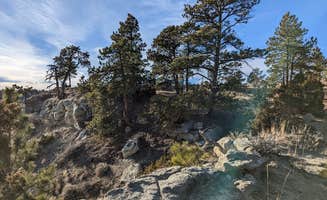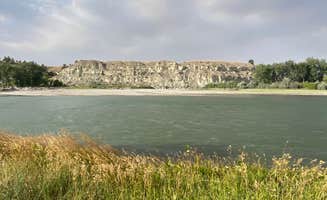Dispersed camping near Acton, Montana provides access to Bureau of Land Management sites at elevations between 3,500-4,000 feet with relatively mild summer nights compared to lower elevations. The region features rolling prairie terrain with scattered groves of cottonwood trees along water sources. Most primitive camping areas remain open year-round but access becomes significantly more difficult during winter months when snow and mud can make roads impassable.
What to do
Mountain biking opportunities: Multiple trail networks throughout Acton Recreation Area offer diverse riding terrain. "This is one of my favorite local riding spots. The trails are well used and vary from flat and easy to moderately difficult. Lots of bicyclers on the trails," notes reviewer Kathi F.
Yellowstone River fishing: Captain Clark provides direct river access with boat launching facilities. "Great spot right next to the river. Has toilet and boat ramp. Shade is good. Not too many things to do around the area unless a boat is brought in, but great for quick one night camping," reports Robert B.
Wildlife viewing: Early mornings offer opportunities to spot native species including wild turkeys, beavers, and various bird species. A visitor at Captain Clark mentioned, "We saw several geese. Heard several wild turkeys but never saw them."
Historical exploration: Nearby Pompey's Pillar National Monument provides educational opportunities about the Lewis and Clark Expedition. "We backtracked the next morning to explore Pompey's Pillar National Monument," shares Dorothy J. about her stay at Captain Clark.
What campers like
River access: Proximity to the Yellowstone River remains a significant draw for many visitors. Morgan B. highlights at Captain Clark: "The Yellowstone River is a fast moving and dangerous river but there is a great swimming hole on the other side of the boat launch."
Night sky viewing: With minimal light pollution, the area offers excellent stargazing opportunities. Madeline O. from Acton Recreation Area reports: "Stars were amazing! Not many bugs."
Secluded sites: Multiple camping areas provide privacy despite being relatively accessible. "Loved this campsite. A bit out of the way from the highway but worth it. About 6 spots, the first 4 are huddled in a circle but we drove further down the rough road and found a secluded spot far from the others," writes Alyson M. about Acton Recreation Area.
Open landscapes: The combination of prairie and river views creates distinct camping experiences. At Bratten Fishing Access Site, David M. describes the setting as "a secret little site surrounded by Prairie. Grasslands and succulent deciduous trees."
What you should know
License requirements: A Montana Conservation License is now required for overnight stays at some locations. Kevin C. advises about Captain Clark: "You do have to have a MT Conservation License to stay here. The out of state variety that I had to purchase was $10 and is good for an entire year at this and any other location in the state that requires it."
Road conditions: Access roads to primitive sites can be challenging and weather-dependent. At Acton Recreation Area, Vincent B. shares: "I checked out the first couple groups of sites with my Subaru Crosstrek pulling a square drop trailer without issue."
Limited facilities: Most sites offer minimal amenities requiring self-sufficiency. "There is a vault toilet near the boat launch. The spots are relatively secluded," explains Morgan B. about facilities at Captain Clark.
Seasonal insects: Mosquito activity varies throughout the season. David M. notes that when camping at Bratten Fishing Access Site in mid-June, conditions were favorable with minimal insects.
Tips for camping with families
Site selection for bathroom access: For families with small children, choosing sites with easier toilet access makes a difference. A reviewer at Acton Recreation Area advises: "Camp up top the first 1-2 sections if not have a truck/high suspension for the dirt road further down. The bathroom near entrance so camp first section if need that daily for easy walk to it. Took my 3 kids and had a great time for 2 days."
Educational opportunities: Combine camping with learning about local wildlife and history. "Easy to imagine Capt. William Clark floating past in 1806 in his lashed together canoes on his way to the Missouri to rejoin Capt. Merriweather Lewis," notes Mike C. at Captain Clark.
Noise considerations: Proximity to transportation corridors affects some camping areas. At Bratten Fishing Access, "You do hear the highway and the trains going by," which might influence site selection for families with light sleepers.
Swimming safety: Areas with safer water access are limited but valuable for families. Morgan B. points out a specific feature at Captain Clark: "There is a great swimming hole on the other side of the boat launch."
Tips from RVers
Length restrictions: Some areas have specific vehicle size limitations. Mike C. cautions about Captain Clark: "Length limit on vehicles is 20 feet. They clarify 20 ft tow vehicle and 20 ft trailer. Don't know how strict they are on this. It would be tough to get anything big in here anyway."
Site accessibility: For RVs and trailers, evaluating road conditions before attempting access prevents problems. Vincent B. describes his experience at Acton: "I checked out the first couple groups of sites with my Subaru Crosstrek pulling a square drop trailer without issue."
Available pad sizes: Bratten Fishing Access offers "about six formal sites with a level gravel spot. Each site can accommodate two vehicles above 33 ft long," according to David M., making it suitable for larger setups.
Advance planning: Given limited services, RVers should prepare accordingly. Kevin C. advises: "There is no place nearby to purchase firewood. Stop in Miles City or Billings on your way in depending on the direction you're coming from if you need it."



